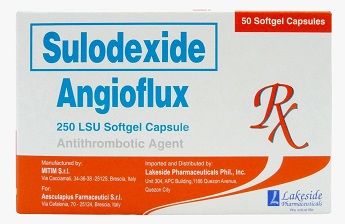COVID-19 Drugs Study FindsThat N-Acetylcysteine Reduces Post-COVID Myocardial Injury And Sulodexide Aids In Endothelial Cells Recovery
COVID-19-Drugs - N-Acetylcysteine - Sulodexide Jul 27, 2023 2 years, 6 months, 4 weeks, 16 hours, 55 minutes ago
Study Finds That Both N-Acetylcysteine And Sulodexide Has Protective Properties On Endothelial Cells After SARS-CoV-2 Infection
COVID-19 Drugs: The world was taken by storm when the severe acute respiratory syndrome coronavirus-2 (SARS-CoV-2) emerged, causing the coronavirus disease 2019 (COVID-19) pandemic. Beyond its devastating impact on the respiratory system, this novel virus also wreaks havoc on other organs, with endothelial cells becoming a primary target. Endothelial cells, which line the blood vessels, play a crucial role in maintaining vascular health. Unfortunately, SARS-CoV-2 infection leads to hyperinflammation and coagulation activation, exacerbating endothelial cell dysfunction.

In this regard, researchers at the Poznan University of Medical Sciences in Poland set out to investigate whether the drugs N-acetylcysteine and Sulodexide could offer protection against the damage caused to endothelial cells after COVID-19 infection.
Understanding the Mechanism of Endothelial Damage
The viral invasion begins in the respiratory system, where SARS-CoV-2 gains entry into the body through endothelial cells. As the immune system responds to combat the virus, it triggers hyperinflammation, leading to the activation of neutrophils, monocytes, and platelets. This, in turn, sets off the coagulation cascade, potentially resulting in intravascular thrombosis.
Endothelial cell dysfunction during COVID-19 is a multi-faceted process. Nitric oxide (NO) deficiency, oxidative stress, inflammation, and damage to the glycocalyx structure all contribute to this deleterious state. Among the complications arising from COVID-19, myocarditis stands out as particularly concerning.
In fact, these mechanisms of endothelial damage are believed to underpin the long-COVID-19 syndrome, which affects a substantial percentage of patients even after recovery.
N-acetylcysteine: A Potential Shield for Endothelial Cells
N-acetylcysteine (NAC) has garnered significant attention for its potential protective role against endothelial damage and dysfunction. By suppressing the secretion of pro-inflammatory cytokines such as NF-κB, IL-8, and IL-6, NAC can reduce the chemotactic migration of monocytes, thus mitigating inflammation.
Furthermore, NAC has demonstrated its ability to combat various viruses, including human immunodeficiency virus (HIV) and respiratory syncytial virus (RSV), by inhibiting viral replication. This protective effect on endothelial cells helps counteract the adverse effects of viral infections on the vascular endothelium.
Previous studies and
COVID-19 Drugs news coverages on other RNA viruses have suggested that NAC might also play a similar protective role in SARS-CoV-2 infection. In fact, there is evidence to suggest that NAC can inhibit the replication of SARS-CoV-2.
https://www.thailandmedical.news/news/break
ing-news-n-acetyl-cysteine-can-cause-conformational-perturbation-of-sars-cov-2-spike-protein,-indirectly-inhibiting-the-virus
In light of these findings, study team sought to explore the potential of NAC in reducing myocardial injury in patients experiencing post-COVID-19 syndrome.
Sulodexide: A Promising Ally in Post-COVID-19 Recovery
Sulodexide, a mixture of glycosaminoglycans primarily composed of 80% fast-moving heparin and 20% dermatan sulfate, has emerged as another potential candidate for COVID-19 therapy, especially for patients with a milder form of the disease. This compound has demonstrated comparable anti-hemostatic effects to enoxaparin.
Sulodexide exhibits a range of effects, including increasing tissue Plasminogen Activator (tPA) production and inhibiting platelet aggregation, which activates arterial and venous anticoagulant and fibrinolytic processes. Additionally, Sulodexide displays anti-inflammatory activity by inhibiting the production of IL-6, a key cytokine implicated in COVID-19 inflammation.
Notably, Sulodexide can be administered to patients with renal impairment and carries a lower risk of bleeding compared to traditional heparin treatments. Research has indicated that Sulodexide may reduce the risk of hospitalization and the need for oxygen supplementation while improving laboratory parameters in early high-risk COVID-19 patients, without an increased bleeding risk.
Experimental Findings and Implications
The research conducted at Poznan University delved into the long-term effects of COVID-19 on endothelial cells, particularly those of the coronary artery. Serum collected from post-COVID-19 patients was exposed to human coronary artery endothelial cells (CAEC) in in vitro cultures. The exposure of CAEC to post-COVID-19 serum generated oxidant stress and induced the production of pro-inflammatory cytokines, such as IL-6, von Willebrand Factor (vWF), tissue Plasminogen Activator (tPA), and Plasminogen Activator Inhibitor-1 (PAI-1).
Crucially, NAC was found to reduce the release of pro-inflammatory cytokines from CAEC when exposed to post-COVID-19 serum, suggesting its potential in mitigating endothelial injury in the coronary arteries of patients with post-COVID-19 syndrome. Similarly, Sulodexide exhibited inhibitory effects on IL-6 secretion, indicating its promise in protecting endothelial cells in patients recovering from COVID-19.
Conclusion
The study conducted at Poznan University of Medical Sciences provides valuable insights into the potential of N-acetylcysteine and Sulodexide in protecting endothelial cells following SARS-CoV-2 infection. As the world continues to grapple with the long-term consequences of the COVID-19 pandemic, understanding the mechanisms of endothelial damage and identifying protective measures are crucial for improving patient outcomes.
While NAC shows promise in reducing myocardial injury during the post-COVID-19 syndrome by mitigating endothelial injury in coronary arteries, Sulodexide's ability to shield endothelial cells may offer vital support in the recovery of COVID-19 patients, especially those with milder forms of the disease.
Further research is needed to fully unlock the potential of these compounds and develop targeted therapies to enhance the recovery and long-term well-being of individuals affected by COVID-19. In the quest to combat the lingering impacts of this unprecedented pandemic, N-acetylcysteine and Sulodexide stand as beacons of hope for a healthier future.
The study findings were published on a preprint server and are currently being peer reviewed.
https://www.biorxiv.org/content/10.1101/2023.07.19.549800v1
For the latest on
COVID-19 Drugs, keep on logging to Thailand Medical News.
